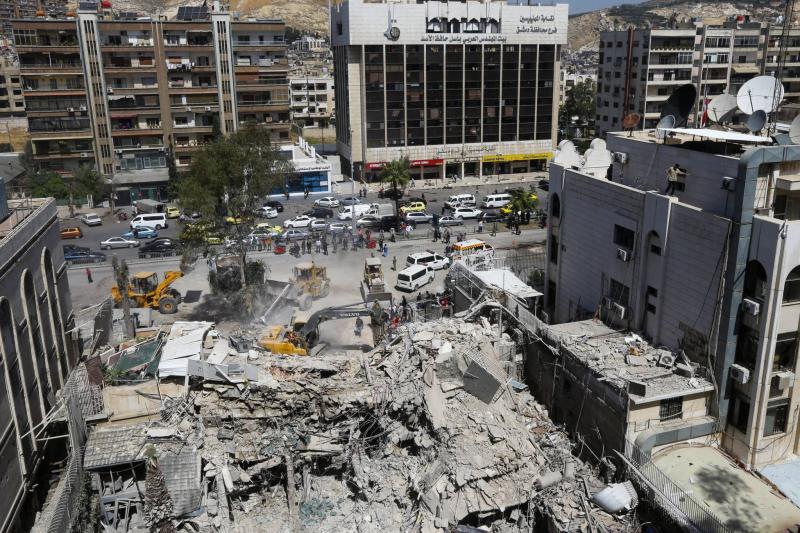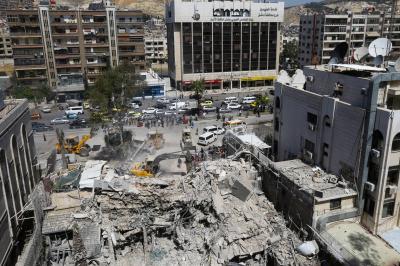Syria has become a battleground for Iranian groups that face daily strikes while experiencing Russian silence and Iranian strategic patience, with a clear attempt by the Syrian regime to avoid direct confrontation as indicated by President Assad. However, the current question arises in light of Israeli escalation and threats to expand confrontations with Hezbollah and Iran in Lebanon: will Syria remain insulated from this broader conflict? Recently, a divergence in Russian and Iranian perspectives has emerged, despite the fact that Iran is likely to suffer significant losses in such a confrontation.
The recent Russian-Iranian relations aim for Russia, under President Putin's rule, to reestablish itself as a competitive power in the international system by asserting its presence in global regions. Meanwhile, Iran seeks to prove itself as a regional power with its own interests. Both countries have worked to establish a relationship that serves these aspirations, despite U.S. and European sanctions on Russia following its annexation of Crimea and interventions in Ukraine and Syria, and the Western sanctions on Iran due to its nuclear program and political projects, which have created a bonding factor between them. Russia views Iran as a strategically important state, crucial to its interests in the Arabian Gulf and the Middle East, particularly since it faces two strategic threats: the first being the U.S. attempt to encircle it through NATO's expansion to contain and surround Russia, and the second being the threat from radical Islamic organizations that have proliferated across Central Asia, a concern shared by Iran, which faces ideological and sectarian opposition from certain extremist Sunni movements, particularly ISIS.
**Russian-Iranian Disagreements on Syria**
Although cooperation between Iran and Russia transcends merely balancing various issues, visible disagreements or differences due to conflicting interests and visions exist, especially regarding the future of post-revolution Syria. Despite their understanding in Syria, significant differences remain, as Iran expresses concern over Russian agreements with Turkey and Israel regarding Syria, which has become a battleground for multiple parties. Additionally, there are disagreements about Syria's future. Moscow prefers a political resolution that guarantees a united and sovereign Syria, carefully managing alliances with regional parties, including Israel. In contrast, Tehran prioritizes enhancing Alawite influence in Syria regardless of its repercussions on the state's future, fearing U.S.-Russian bargaining that could compromise its sway in Syria and the region.
On April 28, 2021, in a leaked audio recording, Iranian Foreign Minister Mohammad Javad Zarif criticized the "Revolutionary Guards'" control over the country’s foreign policy and its involvement in the Syrian civil war at Russia’s behest. The leak coincided with Iran's preparations for presidential elections and rising internal power struggles. Zarif unequivocally stated that the "Quds Force" and Moscow are closely linked, pointing out that this relationship is unequal. He noted that Vladimir Putin compelled Iran to deploy ground forces to Syria: "Soleimani's trip to Russia in 2015 was based on Moscow's desire, not ours. Russia aimed to undermine the achievements of the Foreign Ministry, which is why it invited Soleimani." This characterization starkly contrasts with repeated claims that Soleimani drew Putin into the Syrian conflict. According to Zarif, "Putin entered the war through air force but dragged Iranian ground forces into the war as well. We had no ground forces in Syria at that time."
**Russia and Reviving the Syrian Regime**
Russia attempted to revive the Syrian regime after successfully quelling the armed revolution, yet it has failed to develop political solutions for the regime's future or establish genuine reconciliations that would open doors for Arab countries to support the regime. However, Russian discomfort has grown over Assad's government after Damascus undermined the Arab reconciliation project and failed in relations with Ankara, which Russia sought to strengthen through 21 rounds of Astana negotiations, sidelining Arabs to monopolize political solutions that suited both it and Iran. Russia views Damascus's obstinate stance against its conditions as a result of Iranian pressure on the regime, which complies with the conditions set by the mullahs at the expense of Russia and its role.
The conditions that Damascus insists on for normalizing relations with Ankara are not serious. There must be parallel concessions for serious relationships to establish the regime again at the expense of the Syrian revolution. Regarding Arab relations and reconciliation, Russia understands that Iran was behind the failure of Assad’s commitments to prevent Captagon exports, which entailed one step from the regime against two steps from the Arabs at the expense of the people's blood, as Assad believed that reviving his regime would yield a major strategic outcome, especially after the Saudi-Iranian understandings. However, Assad reaped nothing but catastrophic outcomes between the summits, and it is expected to be comfortable after the Manama Conference, as the Gaza war's consequences will be pressing.
**The Current Conflict over Syria**
It can be said that the Iranian-Russian conflict over the Syrian decision has led to failures for Assad's regime amid the Riyadh and Manama summits regarding the disagreement and assistance in overcoming the Western-imposed siege on the regime and the actual inability of Russia and Iran to address this blockade. If Iran is keen to execute its project in Syria, which aims at maintaining the Alawite regime capable of controlling decisions and keeping Syria as a point of confrontation with the Arabs on one hand and Israel and the international community on the other, then a clear conflict between the Russians and Iranians is observable in the south concerning control over the Syrian-Iranian border, threatening Jordan—the weak flank in the Arab moderate states—and facilitating drug smuggling into the Gulf, along with attempts to transfer military confrontations and threaten Israel by implying a military strike against Jordan to support the West Bank while using the Golan Heights to pressure Israel as a bargaining chip with the United States.
Meanwhile, the Russians consider southern security essential to ensuring ongoing calm in the southern region, preventing chaos in Jordan, and halting drug exports towards the Gulf to maintain good relations with states that could provide leverage against the Western and American pressures on the regime. Moreover, Russia does not want the south to slip from Damascus’s grasp, especially after the city of Suwayda has completely exited the regime’s control, where the United States is contemplating establishing a buffer zone from (Al-Bukamal to Daraa and Quneitra moving through the desert and Suwayda).
**Recent Developments in the Region**
However, the most significant event in our region was the Al-Aqsa Flood on October 7, which did not yield advantages for anyone—particularly Iran and Russia—but was rather a hesitant attempt from the Syrian regime to distance itself from events that do not differentiate between its soldiers and Iranian militias, as Syria is one of the six battlegrounds under Iran's "Unified Front" strategy in pressuring the United States. Can the regime keep its territories in the Golan out of the conflict with Russian assistance, especially with the anticipated Iranian escalation in the near future due to Iranian threats? Particularly since Syrian territory has become a strategic depth for Hezbollah, which spearheads the Iranian confrontation in the region, especially as Hezbollah is now a significant factor in negotiating the forthcoming regional solutions.
The bloody strike in Aleppo on March 29 delivered a clear message to the Syrian regime and Russia that Israel is prepared for confrontation. According to this trend, Assad and his regime will not be able to maneuver or exploit the contradictions between friends and foes. Regarding the future of Iranian-Russian relations and their perspectives on Syria, it hinges on shifts in both domestic and external environments. Observing their relations throughout the past two decades, it is evident that Moscow engages with Iran according to a policy of separating issues, especially since any new strategy in the Arab region must address the matter of occupation and Iranian influence over Arab states, especially Syria, in any forthcoming political negotiation. The Iranians do not possess sovereignty to act as they wish at this juncture, making it a time to press Iran. Despite the extensive relations between Iran and Russia, the military cooperation between the two countries in Syria for over a decade, and the high-level reciprocal visits, along with their intentions to open a new chapter in bilateral relations through an upcoming long-term strategic cooperation treaty, a "dispute" has recently emerged between the two countries, marking a central theme of the current phase amid Iranian diplomatic escalations towards Moscow.
**Khaled Al-Azi**




